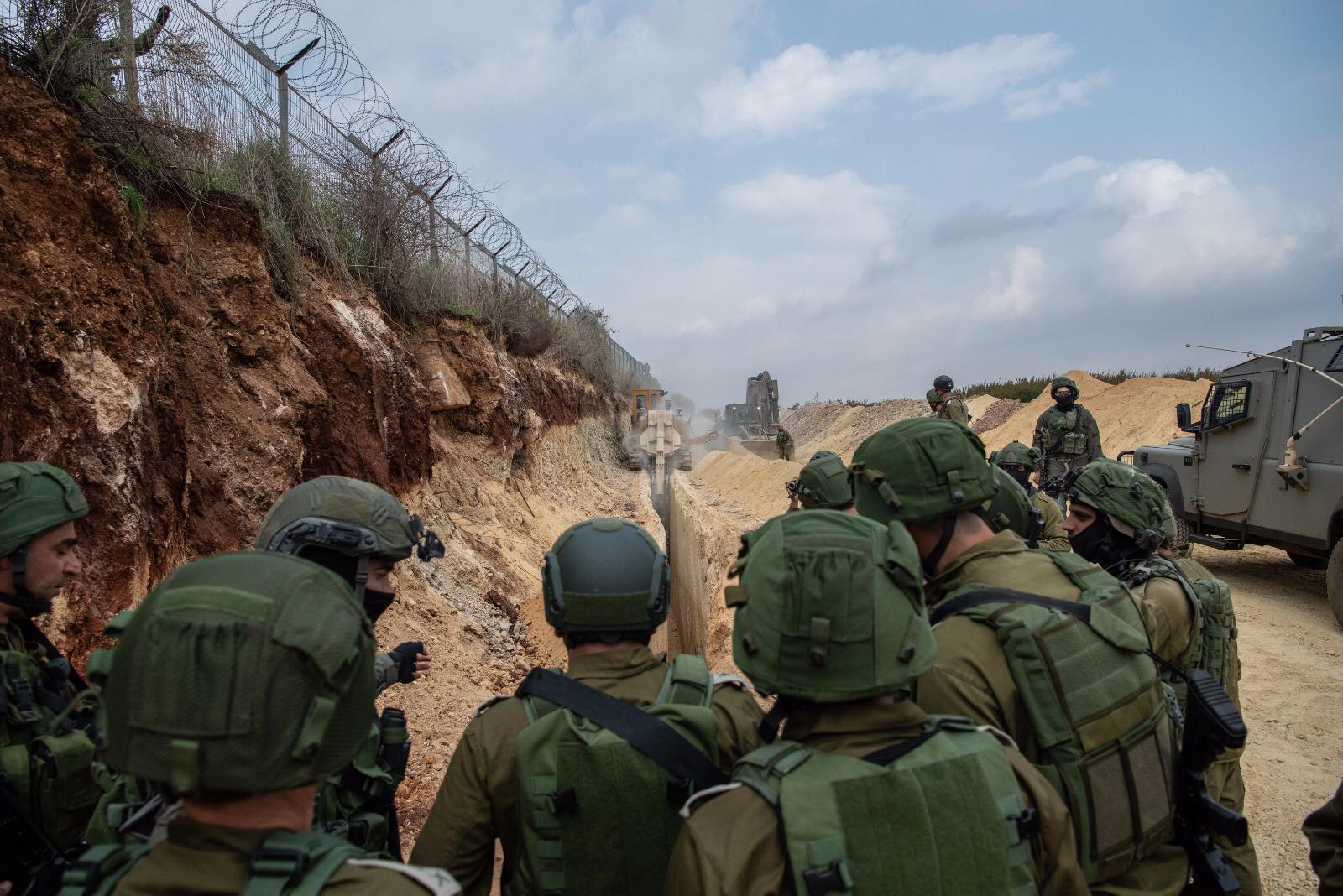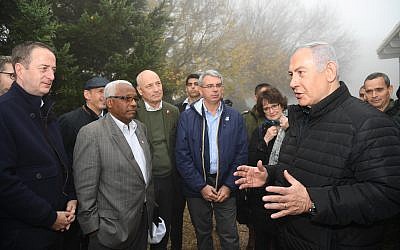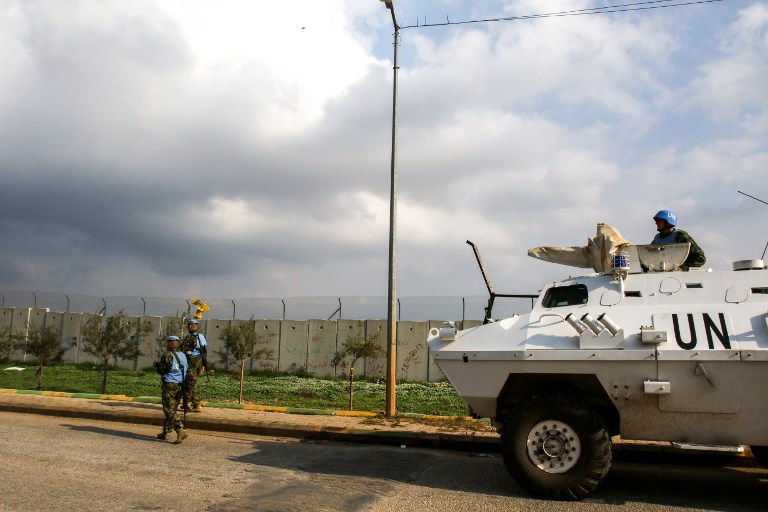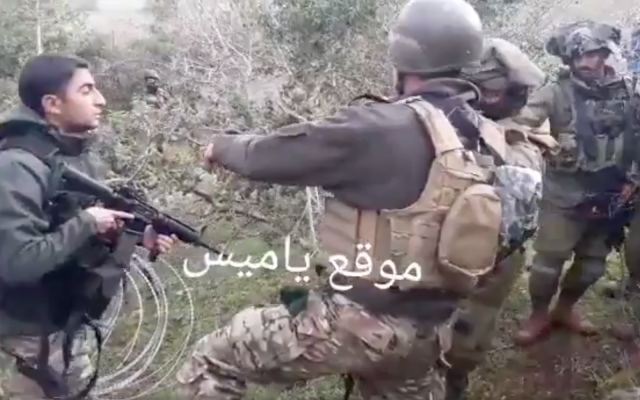UN peacekeepers confirm existence of tunnel from Lebanon into Israel
Calling it a ‘serious occurrence,’ UNIFIL says it will speak to Lebanese authorities about alleged Hezbollah attack passage
By
Judah Ari Gross Today, 1:15 am
2
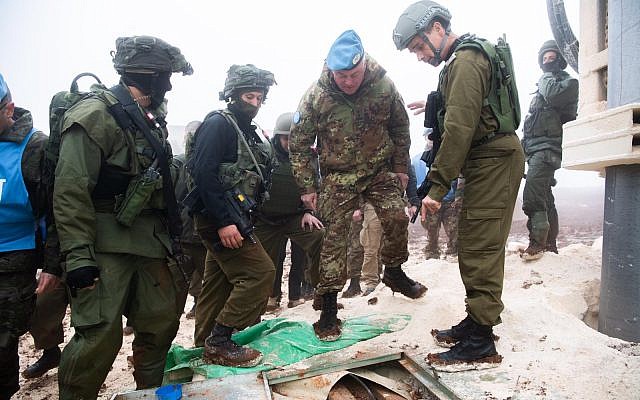
Israeli soldiers show UNIFIL commander Maj. Gen. Stefano Del Col a Hezbollah tunnel that penetrated Israeli territory from southern Lebanon on December 6, 2018. (Israel Defense Forces)
A Lebanon-based United Nations peacekeeping force on Thursday confirmed the existence of a tunnel penetrating Israeli territory from southern Lebanon, which Israel says was dug by the Hezbollah terrorist group.
In a statement, the United Nations Interim Force in Lebanon, known by its acronym UNIFIL, called the tunnel a “serious concern” and said it would investigate the matter with Lebanese authorities.
The tunnel, as well as two others the Israel Defense Forces said it was working to uncover in the western Galilee, was found as part of the military’s newly launched operation to find and destroy Hezbollah attack tunnels, dubbed Operation Northern Shield.
Get The Times of Israel's Daily Edition by email and never miss our top stories Free Sign Up
On Thursday, the Israel Defense Forces led UNIFIL commander Maj. Gen. Stefano Del Col and his delegation to the site of the tunnel, south of the Israeli town of Metulla.
“Based on the site inspection, UNIFIL can confirm the existence of a tunnel at the location,” UNIFIL said in a statement.
The UN peacekeeping force did not immediately confirm that the tunnel was constructed by the Iran-backed Hezbollah.
“UNIFIL is now engaged with the parties to pursue urgent follow-up action. It is very important to determine the full picture of this serious occurrence,” the peacekeeping force said.
If the Shiite terror group was indeed found to have dug the passage, it would likely constitute a violation of UN Resolution 1701, which ended the 2006 Second Lebanon War between Israel and Hezbollah and required all armed groups besides the Lebanese military to remain north of the country’s Litani River.
UNIFIL’s primary mission is to enforce UN Resolution 1701, something Israeli officials routinely criticize the peacekeeping force for failing to do.
“The IDF sees the Lebanese government, Lebanese military and UNIFIL as responsible for all that happens in Lebanon and for the enforcement of Resolution 1701,” the army said in a statement.
In addition to showing Del Col the tunnel south of Metulla, the IDF also said it presented the general with information regarding a second tunnel that originated under a number of homes in the predominately Shiite Lebanese village of Ramiyeh and crossed into Israeli territory near the village of Zarit in the western Galilee.
The Israeli military called on UNIFIL and the Lebanese military to destroy the tunnel inside Ramyeh as it was struggling to locate an opening to the underground passage on the Israeli side of the border.
UNIFIL did not immediately confirm that it had received such a request from Israel.
An IDF spokesperson said the military was confident that the tunnel existed and had penetrated into Israeli territory, but the army was thus far unable to locate a specific opening to it due to the rocky earth and recent inclement weather.
According to the IDF, the tunnel originated in the Lebanese village of Ramyeh underneath a number of homes.
The army confirmed it had soldiers operating at a third location, also in the western Galilee, and IDF spokesperson Lt. Col. Jonathan Conricus said there were other sites where the military believed Hezbollah had dug tunnels into Israeli territory.
The Israeli military said it believes the tunnels were meant to be used by Hezbollah as a surprise component of an opening salvo in a future war, alongside the mass infiltration of operatives above ground and the launching of rockets, missiles, and mortar shells at northern Israel.
A senior Israeli official on Thursday said the tunnels discovered inside Israel were large enough to be used by “entire battalions” to enter Israeli territory in order to “carry out killing sprees and kidnappings and to capture Israeli towns and villages.”
Prime Minister Benjamin Netanyahu elaborated, briefing foreign envoys at the northern border: “If you look at the Hamas tunnels, they’re very narrow, basically for one person. The Hezbollah tunnels are wide. They enable several people to come at once and also to put motorcycles, I’m pretty sure tractors, and so on.”
This, Netanyahu said, was “in order to bring in many forces, simultaneously, which means several battalions into our territory, with the purpose of cutting off communities here, towns, kibbutzim, and then going into a campaign of murder and kidnapping, which could happen simultaneously.”
https://www.timesofisrael.com/un-pe...ign=daily-edition-2018-12-07&utm_medium=email
IDF Chief of Staff Gadi Eisenkot, center, visits soldiers searching for Hezbollah attack tunnels on the Israeli-Lebanese border on December 4, 2018. (Israel Defense Forces)
The number of tunnels the IDF believes the Lebanese terror group has dug into Israel, as well as other information connected to the army’s tunnel-busting operation, cannot be published by order of the military censor.
According to Conricus, the tunnel from the predominantly Shiite village of Ramyeh was not yet operational as it lacked an exit point and did not present an immediate threat to residents of the area, as with the tunnel discovered south of Metulla on Tuesday.
PM Netanyahu (right) briefs foreign diplomats on Israel’s border with Lebanon, December 6, 2018. (Haim Tzach/GPO)
Earlier on Thursday, a senior Israeli official threatened that the IDF may be forced to extend its current tunnel-busting operation across the border and into Lebanese territory.
“It is possible that we will be required to act inside Lebanon,” the official said, speaking on condition of anonymity.
Operation Northern Shield was launched earlier this week due to the fear that the details of the operation would be leaked and revealed to Hezbollah, the senior official said.
“If Hezbollah knew that we knew [about the existence of the tunnels] then this would accelerate their kidnapping efforts, and we did not want to get to a situation where the kidnappers infiltrate into Israel and abduct a soldier or a civilian, and no one would know anything about it,” the senior official said.
The decision to embark on the operation was made on November 7, and was one of the reasons the cabinet decided not to launch a major military campaign against Hamas in Gaza, the official added. “There were other reasons, too, but that was one of them,” he said.
Also on Thursday, Netanyahu briefed foreign diplomats about the army’s ongoing operation, urging them to condemn and sanction the Shiite terror group for its aggressive actions.
United Nations Interim Force in Lebanon (UNIFIL) soldiers patrol along the border wall with Israel near the southern Lebanese village of Kafr Kila on December 4, 2018. (AFP/Mahmoud Zayyat)
“Israel expects an unequivocal condemnation of Hezbollah, the imposition of additional sanctions on Iran, a condemnation from the Lebanese government and a demand that it stop giving its approval for the use of its territory for these attacks against Israel,” he told a group of senior ambassadors from across the globe.
“All of this will come up at the upcoming meeting of the UN Security Council which Israel has demanded. This is an important political and diplomatic step that complements our operational and engineering effort to deny Hezbollah and Iran the tunnels weapon.”
PM Netanyahu briefed ambassadors today on the Hizballah tunnel threat. We visited tunnel site close to the Blue Line. UK condemns such tunnels as blatant and destabilising violation of UN resolutions.
pic.twitter.com/YQZv7Ruj8C
— David Quarrey (@DavidQuarrey)
December 6, 2018
“We are systematically and decisively denying our enemies the tunnels weapon. We are doing this with Hamas, and with Hezbollah; we will do whatever is necessary,” he added.
“Anyone who attacks us is taking his life into his hands,” continued Netanyahu. “Hezbollah knows this and Hamas knows that too.”
Operation Northern Shield has just begun, but at the end of it, “the tunnels weapon, in which Hezbollah has invested so much, will not exist and will not be effective.”
):

 Tosi monet Israelin menestyvien yritysten perustajista ovat tulleet tuon kautta.
Tosi monet Israelin menestyvien yritysten perustajista ovat tulleet tuon kautta.
